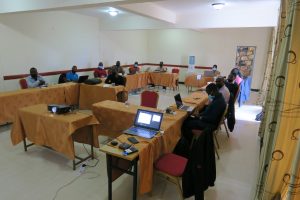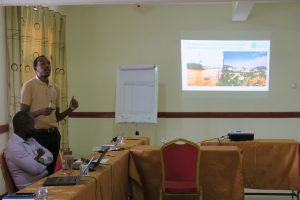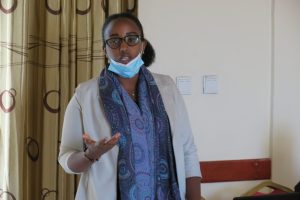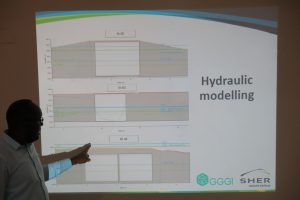In Muhanga Satellite City/Southern Province of Rwanda from October 12-13 2021 – The Global Green Growth Institute (GGGI) held a Technical Workshop on National Adaptation and Preparatory Support for Building Flood Resilience Capacities in Rwanda with the aim of building the capacity of the sub-national technical staff in terms of technical studies and findings of the GCF NAP Project.
The training workshop was organized in collaboration with the Rwanda Environmental Management Authority (REMA), which is the GCF National Designated Authority (NDA). The workshop articipants included technical staff from the cities in which the technical study sites are located, in Rusizi, Huye, and Kamonyi Districts Cities.
The training workshop was organized to achieve the following outcomes:
– Technical capacity on hydrology, hydraulic structures, and Nature Based Solutions (NBS) technical studies, their application on the ground and impact in terms of flood mitigation and landslides prevention strengthened for the subnational technical staff.
– Knowledge and capacity on Gender Equality and Social Inclusion (GESI), and Gender Responsive Budgeting in Environmental Sustainability strengthened for the subnational technical staff.
– Coordination, knowledge management, information sharing, and communication strengthened to effectively mitigate floods and prevent landslides.

The Technical Training Workshop was provided as one of the required activities to achieve some of the outcomes of the project known as GCF NAP Readiness and Preparatory Support for Building Flood Resilience Capacities in Rwanda project. The project is being undertaken by GGGI as a Delivery Partner (DP) and was initiated through the Rwanda National Designated Authority (NDA) i.e Rwanda Environment Management Authority (REMA) and the Accredited Entity (AE) i.e., Ministry of Environment (MoE) of Rwanda to the Green Climate Fund (GCF); to achieve the following objectives:
- Strengthen the capacity and coordination of the main institutions in floods mitigation and landslides prevention;
- Identify and prioritize appropriate technical studies, climate finance strategies and strengthen project pipeline for effective storm water and landslide management in Kigali City and Urban areas experiencing rapid growth and vulnerable to floods and landslides;
- Strengthen knowledge management, information sharing and communications in terms of effective floods mitigation and landslides prevention;
- Develop mechanisms for Reporting, Monitoring and Review of adaptation and resilience planning progress to gather lessons and integrate them into future iterations of the identified flood mitigation and landslide management planning process
Staff members included in the workshop include representatives specializing in the following areas: Infrastructure Planning and Management, Building/Construction permitting and inspection, Environmental Management, Disaster Management, Agriculture and Natural Resources Management, and Water and Sanitation. Participants in the workshop were representatives from such as the Acting Director of OSC, Rusizi District ;District Disaster Management Officer, Rusizi ; Environmental Management Officer, Huye District ;District Disaster Management Officer, Huye District ; Building Inspector, Kamonyi District ; Director of Agriculture and Natural Resources Unit, Kamonyi District ;Water and Sanitation Officer, Kamonyi District
These staff were engaged as they have a direct linkage to floods and landslide hazards in their working environment, hence being the potential technical staff that will champion this in capacity building, coordination, and implementation of the studies on the ground. Therefore, attending this workshop was a good opportunity for them to learn more and improve their knowledge; exchange experiences, share their point of views and inputs to the draft technical studies regarding innovative and strategic solutions in mitigating and preventing floods and landslides.

François Xavier Tetero , GGGI Green City Development Officer
In his opening Remarks, Mr. François Xavier Tetero, the GGGI NAP Senior Officer, highlighted that “This training workshop is organized with the intention of not only building the technical capacity of the participants, but also to serve as a networking opportunity, exchange of knowledge and views, and coordination platform for the participants, as they represent different institutions, with different knowledge background; all contributing to the same subject.” This was also emphasized by the REMA Senior Officer, who therefore called for active and collaborative participation to achieve the desired overall outcome of strengthening coordination and capacity in building flood resilience across the country.

DUKUZE Marie Dalie , NDA-RPSP Project Manager , REMA
The training was conducted parallel with another workshop on Gender Equality and Social Inclusion, which was an opportunity for participants to attend some sessions on the subject matter, bringing additional exchanges and insights on how gender matters would be considered in planning, budgeting, implementation, and reporting across different working sectors.
Justin Mukiza, Director of Agriculture and Natural Resources Unit for Kamonyi District applauded the organisers for this much needed exercise stating that “attending GESI sessions was an opportunity for me to have a deep understanding on this subject and how I will apply it in my work”.
When asked on the key learnings of the training, most the participants demonstrated that, despite the short period of the training, they gained a lot of new knowledge from the different sessions, most importantly on how to apply it in their daily work responsibilities. Mr. Modeste Izerimana, the Director of One Stop Center for Rusizi District responded “I was impressed by the use of the Nature Based Solutions, which I found to be very effective in landslides and flooding prevention; they are cheaper to apply, and play a major role in improving water quality, quantity and biodiversity conservation.
Mr. Egide Nshuti ,Building Inspector in Kamonyi District added that “one of the takeaways is that, as a Building Inspector he is going to improve the level of inspection by not only focusing on building structures, but also considering other green practices that contribute to run-off reduction. This training was very important and informative, we wish that more of these kinds of training workshops can be organized, for us to build our capacity in flood resilience and management” said Mr. Martin Butera, Environmental Management Officer for Huye District. This was one of the recommendations shared by the training participants which indicates that more need to be done in terms of capacity building and coordination for technical staff.
Other recommendations include implementing innovative solutions, such as Nature-Based Solutions (NBS) at policy level and involving implementing entities, such as Rwanda Housing Authority (RHA) and Rwanda Land Use and Management Authority (RLMUA) in the process to enforce implementation on the ground.
Going forward, the next steps post this training workshop will be for GGGI to continuously follow-up and engage with the trained participants to ensure that the gained knowledge is put in practice and explore how to scale up the provided trainings, hence building a cohesive coordination and collaboration in the adaptation and prevention of floods and landslides. The other step is for the consultancy firm (SHER) to consider the inputs, provided by the training participants on some of the designs while finalizing the technical study.

SHER Consultant